Economic wellbeing offered for ethnic minority women
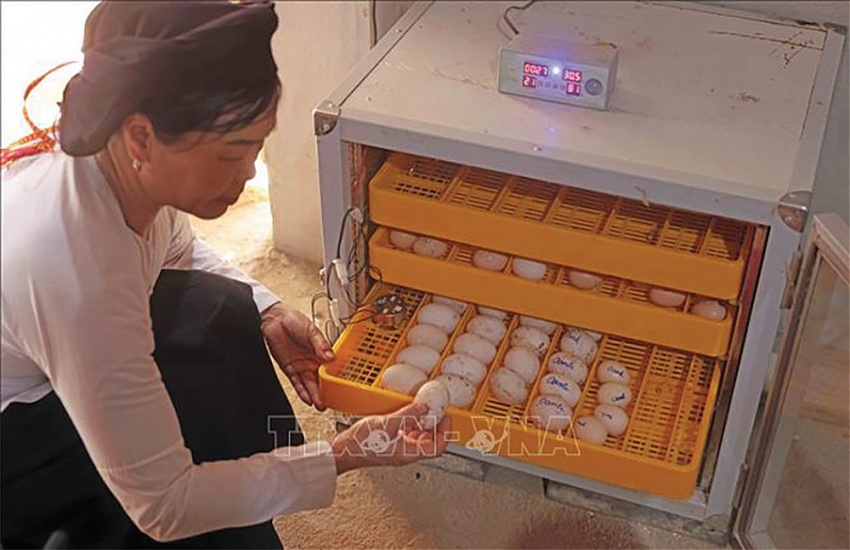 |
| The AWEEV project from CARE International has provided better livelihoods for women in Ha Giang province, Photo: Van Viet |
The role and position of ethnic minority women in Ha Giang is steadily improving, thanks to some major initiatives.
At Tien Nguyen and Yen Thanh communes of Yen Binh town in Quang Binh district, the positive initial results of a project Advancing Women’s Economic Empowerment in Vietnam (AWEEV) by CARE International is clear.
Truong Thi Nhau, a Dao ethnic woman in Tien Nguyen commune, lives in extremely tough conditions in Quang Binh. From the centre of the commune, it is only a few kilometres to Hong Son village, where her family lives, but the roads are craggy and steep, barely big enough for a motorbike to pass through.
Coming from a poor household, her only assets were two buffaloes, swept away by floods in August 2022.
“At that time, we were too depressed. Both my parents had passed away so we had no support, and the two children are too young. Our capital and assets were swept away, while the loan for buying the buffalo had not been paid yet,” she said.
One year later, Nhau was asked to join the goat farming group under the AWEEV project. She got a loan of $200 without lending rates to buy two breeding goats. Learning from others, Nhau and her husband’s goat farming business thrived. Five more goats were soon born.
“At the current goat price of about $5 per kilogramme, we have earned some profit based on the $200 initial loan,” she said.
Several other women are receiving loans in the goat farming group of Hong Son village. Every household can borrow for 18 months, divided into two principal payments. The purchased goat breeds are growing very well and the herd is increasing rapidly.
“Realising the effectiveness of the project, other women want to join the group. They not only receive preferential loans, but are also guided in knowledge, skills, and sharing experiences in the economic model,” said Dang Xa Tram, head of the group.
The village has many ponds and lakes, along with good climate and soil. Some women have chosen raising short-necked ducks adapted to climatic conditions. The AWEEV project has provided capital at $1,250 and egg incubators, and the first 10 households have already received interest-free loans for six months to develop the flock.
Hoang Thi Lien, a group member, said she raises ducks for meat and eggs. “For sales, we don’t need to carry them far. We post it on the Zalo group of the village women’s union to sell them immediately. Every duck can sell for $10,” Lien said.
Quang Binh district is located at the western tip of Ha Giang province. With an area of nearly 792 square kilometres, it is home to many ethnic minority communities like Mong, Dao, Tay, and Pa Then, whose incomes mainly come from agricultural production, forestry, and services. The area has a poverty rate of 26.4 per cent.
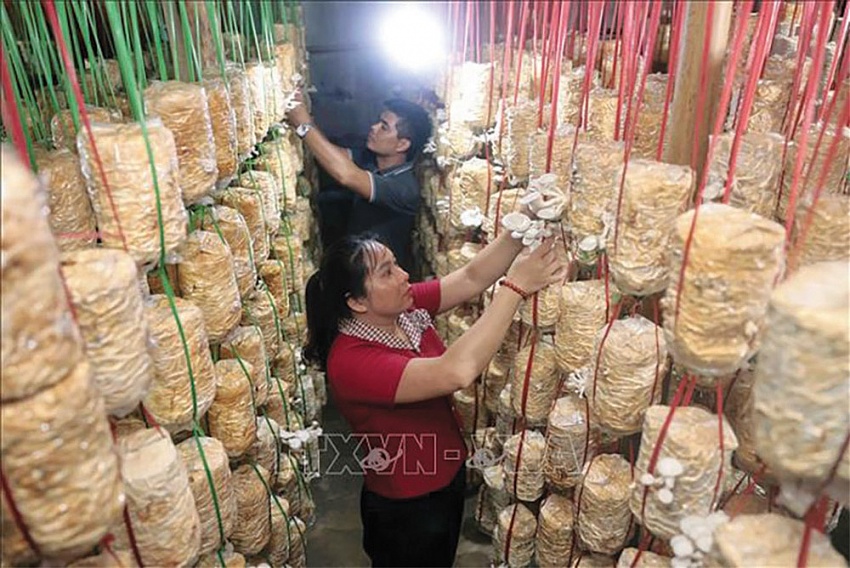 |
Support to start a business
In addition to livelihood model groups, in early 2023, CARE announced support activities for women to start businesses, enhancing economic empowerment for ethnic minority women.
Hung Thi Dang of the Pa Then ethnic group, whose population is over 5,000, said that Thuong Binh village in Yen Thanh commune was a well-known tea-growing area of the province.
Seeing the potential of the tea market and the ways to improve the income of tea growers, Dang thought of a factory to process tea. In early 2023, CARE organised a competition to support women in starting a business, she participated and convinced the organisers to support part of the costs, machinery and equipment, and training in tea processing techniques.
“Although tea is the main source of income, very few people have the skills of care, and harvesting, and do not know how to improve the quality of tea buds. We sold to wholesalers at very low prices,” Dang said.
Then participating in a project supporting women’s startups, she received guidance, and training, and was able to draw up a business plan. Three months after building the factory and receiving technical training CARE provided four machines for free and a loan of tens of thousands of US dollars, she started producing and selling good-quality dry tea at higher prices than before.
“Before working in tea, my income was only about $120-160 per month by doing numerous things. And now, my monthly income is about $290-330, so my livelihood is getting much better in addition to creating some jobs for other people here,” Dang said.
In Yen Binh town, Hoang Thi Hien’s mushroom growing workshop has been developing well. She had the idea of growing mushrooms since 2008, but her dream came true after getting assistance from the AWEEV project, which has already provided an interest-free loan of more than $4,580 and a potting machine worth more than $1,250.
“I started with 20,000 mushroom gourds and can now deliver high standard and quality products to the market,” Hien said.
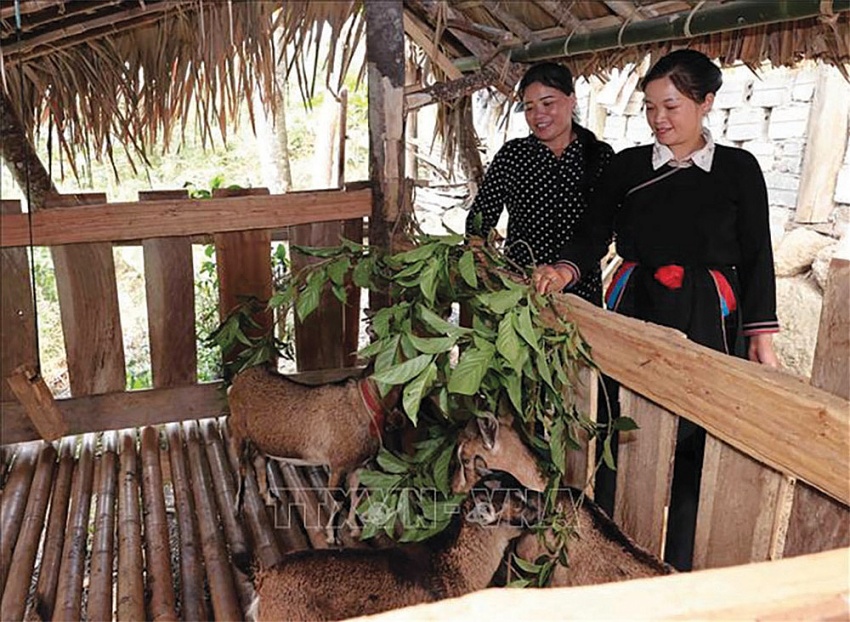 |
Empowering ethnic women
Nguyen Thi Quyen, chairwoman of the Quang Binh district’s Women’s Union, said that six of 15 communes in the district that are under the coverage of CARE’s project were struggling, and some villages do not even have electricity.
“CARE’s project has made a great impact on the socioeconomic development of the district, especially contributing to hunger eradication and poverty reduction for ethnic minorities,” Quyen said.
In 2022, the poverty rate of the entire district was 15.08 per cent and decreased to 9.24 per cent by the end of 2023. And the rate of near-poor households in was 11.32, and 7.83 per cent, respectively.
All aspects of women’s lives have been changing significantly. CARE supplied numerous production materials such as banana slicers, wood-saving stoves, and kitchens at kindergartens, so that women spend less time doing housework, less time taking care of their children, and more on business and taking care of themselves.
“Over recent years, the economic status of ethnic minority women has improved remarkably. Awareness of women’s economic empowerment and gender equality is raised. Ethnic minority women are gradually asserting themselves and being autonomous in orienting their family’s production and business,” Quyen said.
“In six communes, there are 32 self-managed livelihood and savings credit groups, including over 730 members, lending to nearly 150 women, with annual savings of over $40,000.”
The women are excited because they have money to borrow on a rotating basis, and they still have savings to divide at the end of the year. Some new business ideas, that were once only cherished in their heads, have been supported. Some women have succeeded in their own startups.
The community’s and men’s awareness of women has also changed, and some work that used to be carried out by women is now taken care of by men.
Nguyen Duc Thanh, manager of development projects of CARE International in Vietnam, said that the AWEEV project supported women-led livelihood development to improve the economic wellbeing of ethnic minority women.
“The project puts women at the centre, developing economic models that women themselves discuss, decide on and choose to invest in, suitable to the conditions of each area. That is one of the most outstanding aspects of AWEEV,” Thanh said.
AWEEV, funded by the Canadian government, is being implemented for 2021-2025 by CARE International. Its target is over 2,630 ethnic minority women and men in the districts of Tam Duong in Lai Chau province and Quang Binh in Ha Giang province, with a total cost of more than $3.45 million.
The project will directly contribute to the national programme on socioeconomic development in ethnic minority and mountainous areas, as well as the national strategy on gender equality.
The project addresses key issues, such as supporting livelihoods, reducing the burden of care work, improving women’s decision-making, promoting access to financial services, and enhancing the economic status of ethnic minority women.
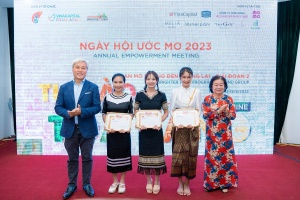 | Brighter Path programme hosts empowerment meeting for ethnic minority girls VinaCapital Foundation and the Vu A Dinh Scholarship Fund convened ethnic minority female scholars from the Brighter Path programme for its Annual Empowerment Meeting from August 15-18 in Hanoi. |
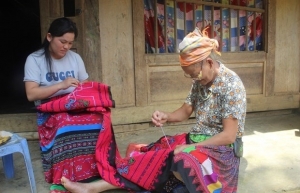 | Mong ethnic people in Thanh Hoa enjoy better quality of life Home to over 19,500 Mong ethnic people, the central province of Thanh Hoa has carried out a number of socio-economic development programmes and projects to give a facelift to areas where they live. |
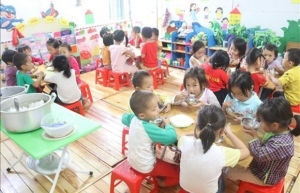 | Stunting, underweight rates among ethnic minority children remain high The rates of stunting and underweight among children aged under five in ethnic groups in Vietnam remain at 31.4 per cent and 21 per cent respectively, according to the National Institute of Nutrition. |
What the stars mean:
★ Poor ★ ★ Promising ★★★ Good ★★★★ Very good ★★★★★ Exceptional
Related Contents
Latest News
More News
- Tet event in Japan celebrates success of 14th National Party Congress (January 25, 2026 | 10:04)
- 14th National Party Congress wraps up with success (January 25, 2026 | 09:49)
- Congratulations from VFF Central Committee's int’l partners to 14th National Party Congress (January 25, 2026 | 09:46)
- List of newly-elected members of 14th Political Bureau announced (January 23, 2026 | 16:27)
- 14th Party Central Committee unanimously elects To Lam as General Secretary (January 23, 2026 | 16:22)
- List of members of 14th Party Central Committee announced (January 23, 2026 | 09:12)
- Highlights of fourth working day of 14th National Party Congress (January 23, 2026 | 09:06)
- Press provides timely, accurate coverage of 14th National Party Congress (January 22, 2026 | 09:49)
- Press release on second working day of 14th National Party Congress (January 22, 2026 | 09:19)
- Minister sets out key directions to promote intrinsic strength of Vietnamese culture (January 22, 2026 | 09:16)

 Tag:
Tag:




















 Mobile Version
Mobile Version